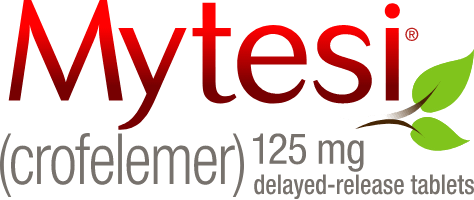HIV-related, noninfectious diarrhea and GI enteropathy

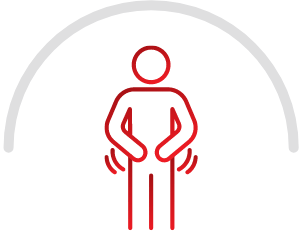


During the acute stage of HIV infection, the virus spreads rapidly throughout the GI mucosa, immediately targeting CD4+ T cells and damaging the intestinal lining.1,2
HIV-related enteropathy is characterized by chronic (>1 month duration), noninfectious diarrhea and CD4+ T cell depletion, which can persist despite CD4+ T cell recovery occurring with ART.1,3-6


This leads to a decrease in the ability of epithelial cells to maintain ionic balances and results in mucosal damage (GI enteropathy).1
This damage to the epithelial barrier can result in an altered gut microbiome, leaky-flux diarrhea, chronic immune activation, and/or impaired chloride ion secretion (secretory diarrhea).1,2,7,8
HIV enteropathy causes damage to the small intestine1
Direct effects

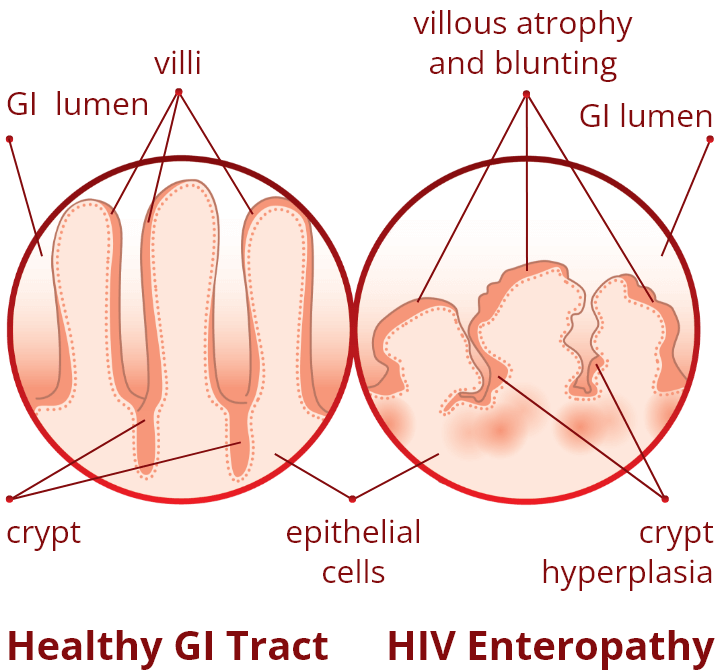
Indirect effects
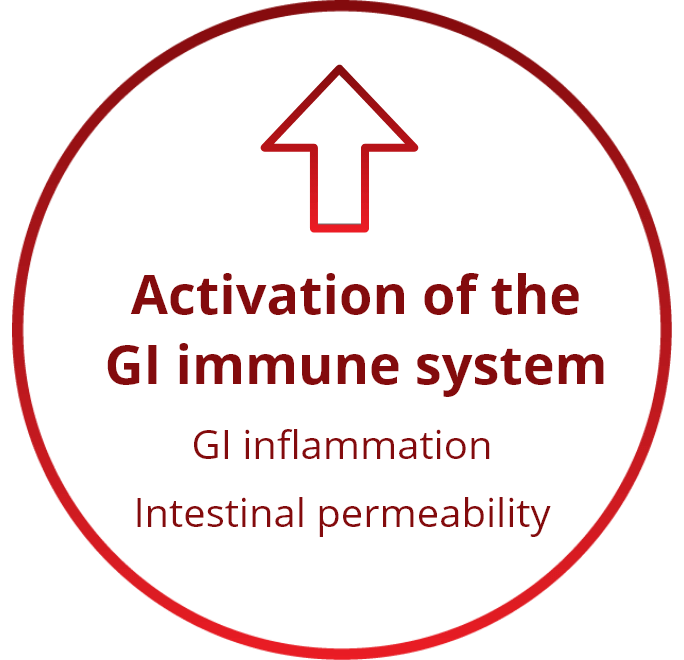
In GI enteropathy, the small intestine lining shows
blunting and atrophy of the villi,1 resulting in:





One way to minimize HIV-related noninfectious diarrhea is by regulating the cAMP-stimulated CFTR and CaCC ion channels in the GI tract, which normalize the salt-water balance, decreasing chloride and water flow.10,11,†
Mytesi is a first and only antisecretory, antidiarrheal drug that normalizes
chloride and water flow in the GI tract.
Who experiences HIV-related diarrhea?
According to a 2017 survey of 350 people living with HIV who experience diarrhea12:

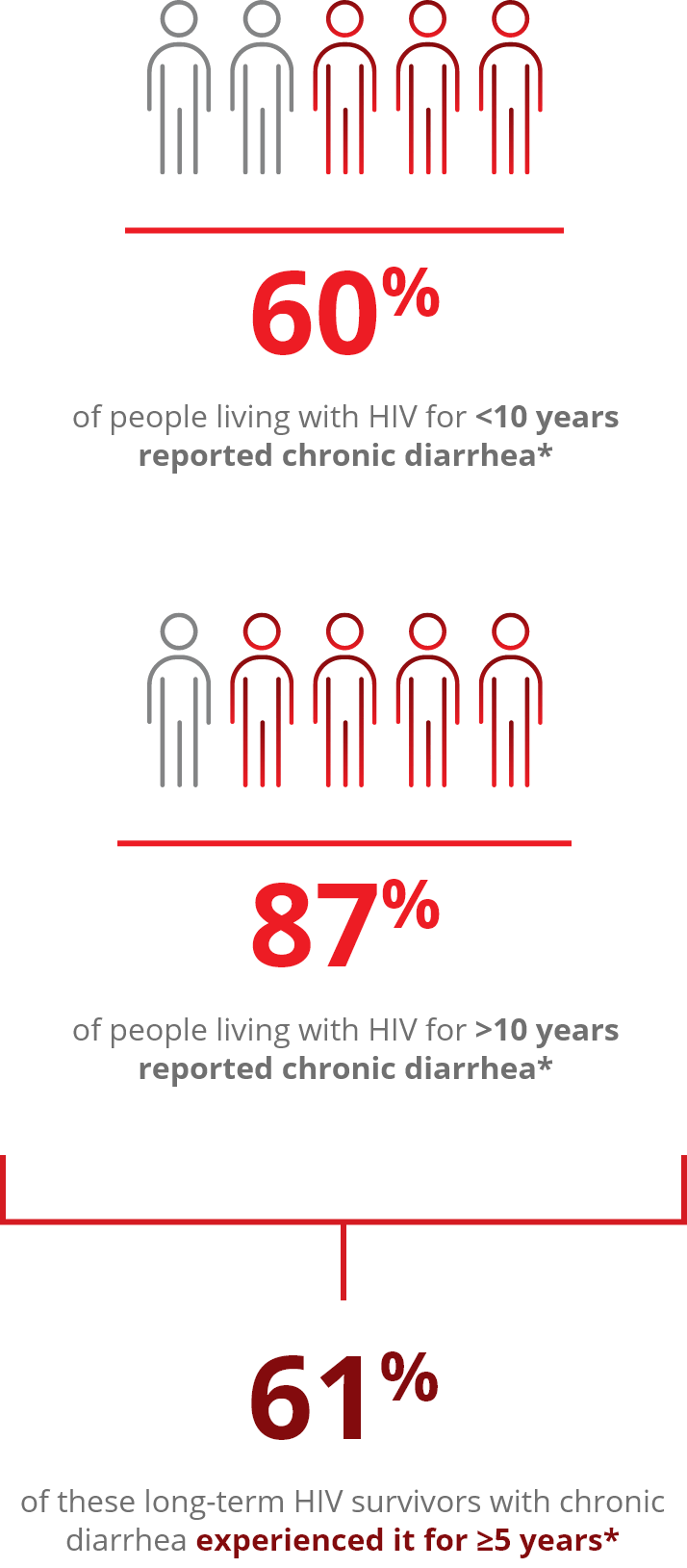
*Types of diarrhea unspecified. Chronic diarrhea defined as diarrhea occurring for greater than 1 month in duration.
How to encourage open discussion about chronic diarrhea with your patients

The traditional approach:
“Have you noticed any changes in bowel habits?”


Try this instead:
“How many unformed, loose, or watery stools are you having per week?”
The traditional approach may not elicit the information you need if a patient has been living with diarrhea for awhile because they may not perceive a “change.”
†CaCC=calcium-activated chloride channel; cAMP=cyclic adenosine monophosphate; CFTR=cystic fibrosis transmembrane conductance regulator.
References:
1. Brenchley JM, Douek DC. HIV infection and the gastrointestinal immune system. Mucosal Immunol. 2008;1(1):23-30. doi:10.1038/mi.2007.1 2. Feasey NA, Healey P, Gordon MA. Review article: the aetiology, investigation, and management of diarrhoea in the HIV-positive patient. Aliment Pharmacol Ther. 2011;34(6):587-603. doi:10.1111/j.1365-2036.2011.04781 3. Kim CJ, Rousseau R, Huibner S, et al. Impact of intensified antiretroviral therapy during early HIV infection on gut immunology and inflammatory blood biomarkers. AIDS. 2017;31(11):1529-1534. doi:10.1097/QAD.0000000000001515 4. Mehandru S, Poles MA, Tenner-Racz K, et al. Lack of mucosal immune reconstitution during prolonged treatment of acute and early HIV-1 infection. PLoS Med. 2006;3(12):e484. doi:10.1371/journal.pmed.0030484 5. Costiniuk CT, Angel JB. Human immunodeficiency virus and the gastrointestinal immune system: does highly active antiretroviral therapy restore gut immunity? Mucosal Immunol. 2012;5(6):596-604. doi:10.1038/mi.2012.82 6. Schiller LR, Pardi DS, Sellin JH. Chronic diarrhea: diagnosis and management. Clin Gastroenterol Hepatol. 2017;15(2):182-193.e3. doi:10.1016/j.cgh.2016.07.028 7. Sim JH, Mukerji SS, Russo SC, Lo J. Gastrointestinal dysfunction and HIV comorbidities. Curr HIV/AIDS Rep. 2021;18(1):57-62. doi:10.1007/s11904-020-00537-8 8. Monaco CL, Gootenberg DB, Zhao G, et al. Altered virome and bacterial microbiome in human immunodeficiency virus-associated acquired immunodeficiency syndrome. Cell Host Microbe. 2016;19(3):311-322. doi:10.1016/j.chom.2016.02.011 9. Gordon SN, Cervasi B, Odorizzi P, et al. Disruption of intestinal CD4+ T cell homeostasis is a key marker of systemic CD4+ T cell activation in HIV-infected individuals. J Immunol. 2010;185(9):5169-5179. doi:10.4049/jimmunol.1001801 10. Macarthur RD. Management of noninfectious diarrhea associated with HIV and highly active antiretroviral therapy. Am J Manag Care. 2013;19(12 Suppl):s238-245. 11. Patel TS, Crutchley RD, Tucker AM, Cottreau J, Garey KW. Crofelemer for the treatment of chronic diarrhea in patients living with HIV/AIDS. HIV AIDS (Auckl). 2013;5:153-162. doi:10.2147/HIV.S30948 12. Online Survey of Patients Living with HIV (2017). Sponsored by Napo Pharmaceuticals.
